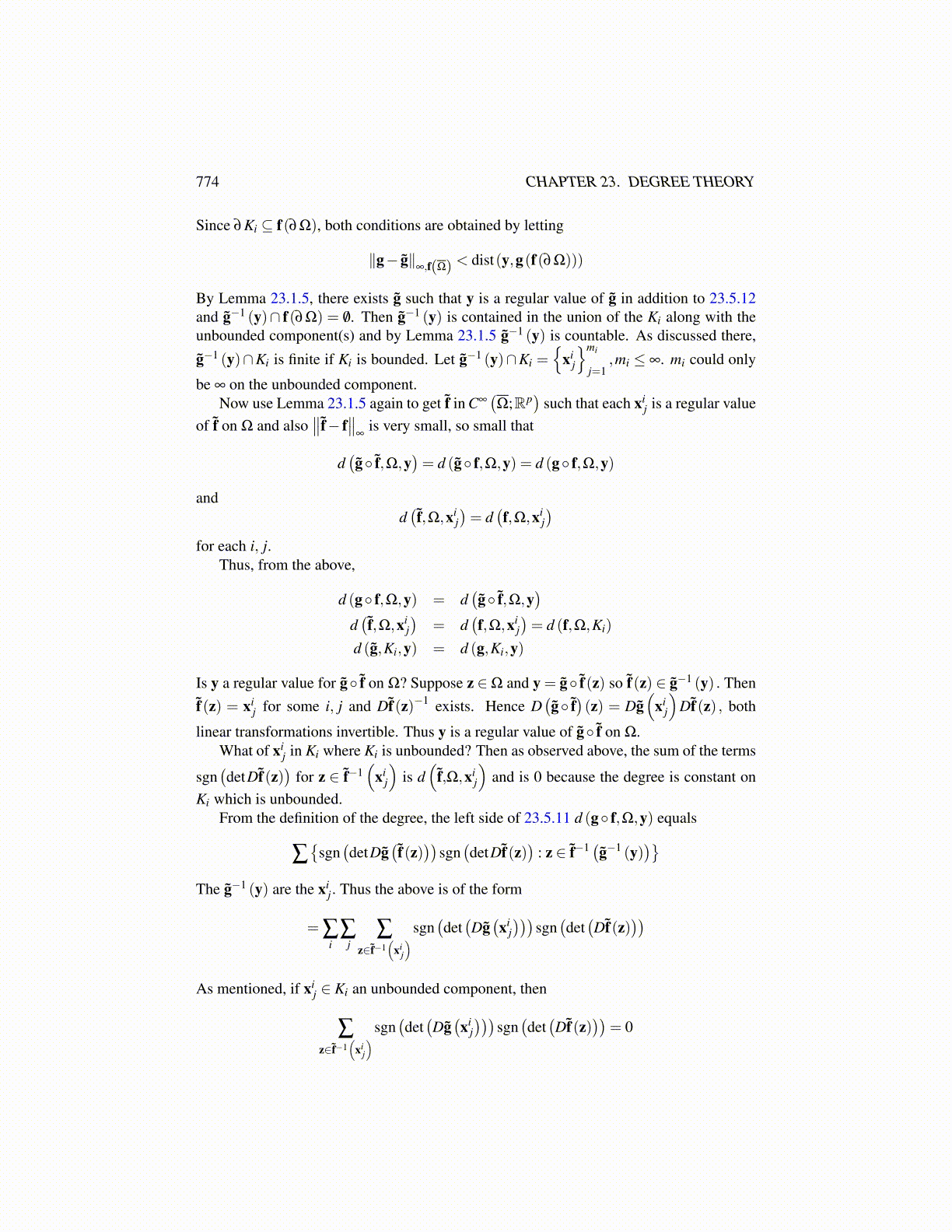
774 CHAPTER 23. DEGREE THEORY
Since ∂Ki ⊆ f(∂Ω), both conditions are obtained by letting
∥g− g̃∥∞,f(Ω) < dist(y,g(f(∂Ω)))
By Lemma 23.1.5, there exists g̃ such that y is a regular value of g̃ in addition to 23.5.12and g̃−1 (y)∩ f(∂Ω) = /0. Then g̃−1 (y) is contained in the union of the Ki along with theunbounded component(s) and by Lemma 23.1.5 g̃−1 (y) is countable. As discussed there,
g̃−1 (y)∩Ki is finite if Ki is bounded. Let g̃−1 (y)∩Ki ={
xij
}mi
j=1,mi ≤ ∞. mi could only
be ∞ on the unbounded component.Now use Lemma 23.1.5 again to get f̃ in C∞
(Ω;Rp
)such that each xi
j is a regular valueof f̃ on Ω and also
∥∥f̃− f∥∥
∞is very small, so small that
d(g̃◦ f̃,Ω,y
)= d (g̃◦ f,Ω,y) = d (g◦ f,Ω,y)
andd(f̃,Ω,xi
j)= d
(f,Ω,xi
j)
for each i, j.Thus, from the above,
d (g◦ f,Ω,y) = d(g̃◦ f̃,Ω,y
)d(f̃,Ω,xi
j)
= d(f,Ω,xi
j)= d (f,Ω,Ki)
d (g̃,Ki,y) = d (g,Ki,y)
Is y a regular value for g̃◦ f̃ on Ω? Suppose z ∈Ω and y = g̃◦ f̃(z) so f̃(z) ∈ g̃−1 (y) . Thenf̃(z) = xi
j for some i, j and Df̃(z)−1 exists. Hence D(g̃◦ f̃
)(z) = Dg̃
(xi
j
)Df̃(z) , both
linear transformations invertible. Thus y is a regular value of g̃◦ f̃ on Ω.What of xi
j in Ki where Ki is unbounded? Then as observed above, the sum of the terms
sgn(detDf̃(z)
)for z ∈ f̃−1
(xi
j
)is d
(f̃,Ω,xi
j
)and is 0 because the degree is constant on
Ki which is unbounded.From the definition of the degree, the left side of 23.5.11 d (g◦ f,Ω,y) equals
∑{
sgn(detDg̃
(f̃(z)
))sgn(detDf̃(z)
): z ∈ f̃−1 (g̃−1 (y)
)}The g̃−1 (y) are the xi
j. Thus the above is of the form
= ∑i
∑j
∑z∈f̃−1
(xi
j
)sgn(det(Dg̃(xi
j)))
sgn(det(Df̃(z)
))
As mentioned, if xij ∈ Ki an unbounded component, then
∑z∈f̃−1
(xi
j
)sgn(det(Dg̃(xi
j)))
sgn(det(Df̃(z)
))= 0